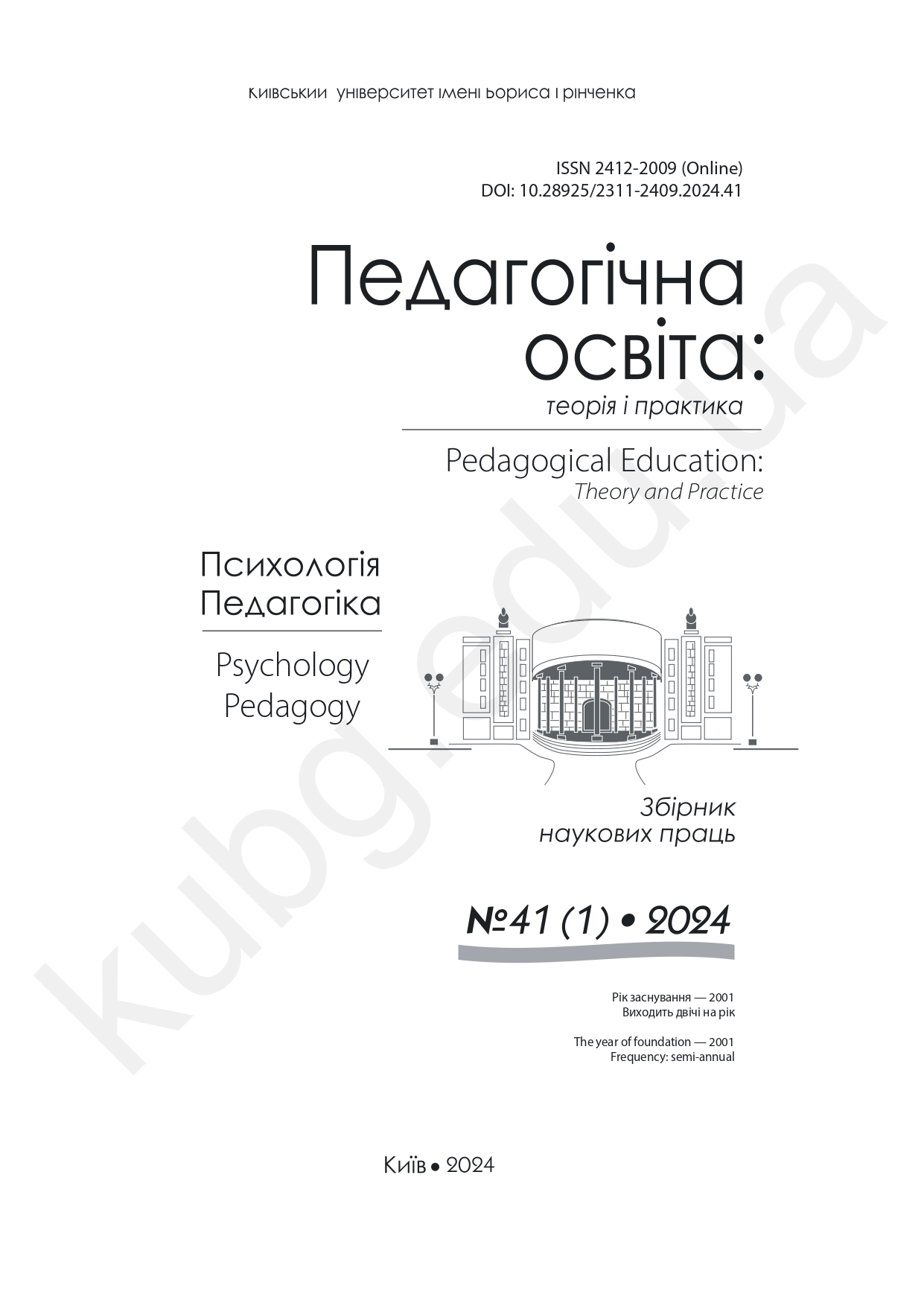Teacher’s readiness for innovative activity: structure, criterion apparatus, diagnostic toolkit
DOI:
https://doi.org/10.28925/2311-2409.2024.412Abstract
Innovation has become an essential feature of all spheres of modern society, objectively determining
the innovative development of higher pedagogical education as one of the basic social institutions that shapes
an innovative personality. Therefore, the issue of teacher readiness for innovative professional activity is becoming
increasingly relevant. The aim of this article is a theoretical consideration of the problem of innovative activity
of a teacher in general and his readiness for such activity in particular. The objectives of the study are to define
the essence and structure of teacher readiness for innovative activity. The theoretical approaches of scientists
to the structure and content of the components of such readiness are analyzed. The authors propose a structure
of teacher readiness for innovative activity as an integrative characteristic of the personality, consider the content
of innovative-personal orientation (a set of motives, needs, values, attitudes that reflect a stable value attitude
towards innovation; adaptability in conditions of socio-personal uncertainty; the need to update the strategy
of professional activity on the principles of transgression), innovative awareness (erudition in fundamental
knowledge and achievements of modern science and trends in higher education and innovation; general
awareness of innovations in education), content-innovative activity (this component is associated with the constant updating of the content of academic disciplines based on taking into account innovative guidelines
of strategic normative documents, educational standards, innovative potential of educational programs;
implementation of innovative content in the educational process through an innovative format of interaction
between subjects of the educational process) and reflection of innovativeness (awareness of one’s own innovative
potential in professional activity, including the feeling of a lack of knowledge about the technological support
of the implementation of pedagogical innovations; evaluation of the innovativeness of one’s own professional
activity and forecasting its results and prospects) of the components of teachers’ readiness for innovative
activity. The criteria and indicators of readiness are substantiated, the levels of teachers’ readiness for innovative
activity are identified (low, medium, sufficient, high), and the author’s diagnostic tool for determining the level
of formation of teacher readiness for innovative professional activity is proposed
Downloads
References
Біла книга національної освіти України / Т. Ф. Алексєєнко, В. М. Аніщенко, Г. О. Балл та ін.; за заг.
ред. акад. В. Г. Кременя; НАПН України. — К. : Інформсистеми, 2010. С. 315–333.
Желанова В.В. Інноваційний вимір сучасної вищої освіти: аналіз напрямів. Науковий журнал «Інноваційна педагогіка». 2022. 1 (50). с. 145–148.
Желанова В.В. Модель інноваційної особистості: структурно-динамічний підхід. Педагогічна
освіта: теорія і практика. Психологія. Педагогіка. 2023. (39(1)). с. 12–18.
Леонтьєва І.В. Реалії інноваційності розвитку вищої педагогічної освіти, або коли зникає інтернет. Педагогічна освіта: Теорія і практика. Психологія. Педагогіка. 2022. 38 (2), 57–62. https://doi.
org/10.28925/2311-2409.2022.389
Леонтьєва І.В. Інноваційність — conditio sine qua non розвитку вищої педагогічної освіти? Науковий вісник Ужгородського університету. Серія: Педагогіка. Соціальна робота. 2021. 2 (49)). с. 92–96.
Режим доступу: https://elibrary.kubg.edu.ua/id/eprint/38712/
Клімова Г.П. Феномен інноваційного суспільства в соціально-філософському дискурсі. Конституційні засади розвитку інноваційного суспільства: зб. наук. пр. за матеріалами інтернет-конференції, 25 червня 2021 року. — Харків: НДІ ПЗІР НАПрН України, 2021. — С. 35–41. Режим доступу:
https://openarchive.nure.ua/handle/document/17437
Khoruzha, Liudmyla та Zhelanova, Victoria та Bratko, Mariia та Palamar, Svitlana та Leontieva,
Inna (2023) Transgressiveness, Innovation, and Readiness of the Modern Teacher for Change In Proceedings
of the 4th International Conference on History, Theory and Methodology of Learning (ICHTML 2023).
с. 163–172
QS World University Rankings . Режим доступу: https://euroosvita.net/index.php/?category=57
Rogers E. Diffusion of innovation. San Fransisco : Free Press, 1983. 341 р
The Global Innovation Index 2023 captures the innovation ecosystem performance of 132 economies
and tracks the most recent global innovation trends. Режим доступу: https://euroosvita.net/prog/data/
attach/8033/wipo-pub-global-innovation-index-2023.pdf
REFERENCES
Bila knyha natsionalnoi osvity Ukrainy [White Book of National Education of Ukraine]. 2010. S. 315–333.
[in Ukrainian]
Zhelanova, V.V. (2022) Innovatsiinyi vymir suchasnoi vyshchoi osvity: analiz napriamiv [Innovative
dimension of modern higher education: analysis of directions]. 1 (50). s. 145–148. [in Ukrainian]
Zhelanova V.V. (2023) Model innovatsiinoi osobystosti: strukturno-dynamichnyi pidkhid [Model
of innovative personality: structural and dynamic approach] (39(1)). s. 12–18. [in Ukrainian]
Leontieva, I. (2022). Realii innovatsiinosti rozvytku vyshchoi pedahohichnoi osvity, abo koly znykaie
internet [Realities of innovation in the development of higher pedagogical education, or when the Internet
disappears]. 38 (2), 57–62. https://doi.org/10.28925/2311-2409.2022.389 [in Ukrainian]
Leontieva, I.V. (2021) Innovatsiinist — conditio sine qua non rozvytku vyshchoi pedahohichnoi osvity?
[Innovation — conditio sine qua non of the development of higher pedagogical education?]. 2 (49)). s. 92–96.
https://elibrary.kubg.edu.ua/id/eprint/38712/ [in Ukrainian]
Klimova H.P. (2021) Fenomen innovatsiinoho suspilstva v sotsialno-filosofskomu dyskursi [The Phenomenon
of an Innovative Society in Socio-Philosophical Discourse]. S. 35–41.
https://openarchive.nure.ua/handle/document/17437 [in Ukrainian]
Khoruzha, Liudmyla та Zhelanova, Victoria та Bratko, Mariia та Palamar, Svitlana та Leontieva, Inna
(2023) Transgressiveness, Innovation, and Readiness of the Modern Teacher for Change In Proceedings
of the 4th International Conference on History, Theory and Methodology of Learning (ICHTML 2023).
с. 163–172. [in Ukrainian]
QS World University Rankings . Режим доступу: https://euroosvita.net/index.php/?category=57
[in English]
Rogers E. Diffusion of innovation. San Fransisco : Free Press, 1983. 341 р
The Global Innovation Index 2023 captures the innovation ecosystem performance of 132 economies
and tracks the most recent global innovation trends. Режим доступу: https://euroosvita.net/prog/data/
attach/8033/wipo-pub-global-innovation-index-2023.pdf [in English]

